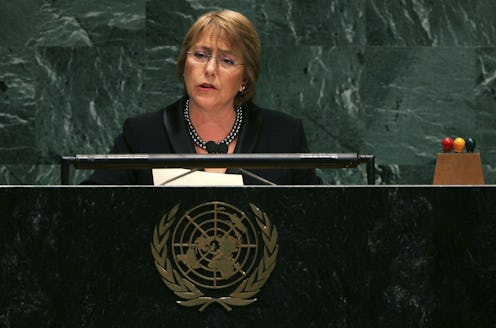News
Chile's Presidential Race is Kind of a Big Deal
The two main candidates for Chile's upcoming presidential elections are women. The highest position of power in a conservative country is being fought for by two women. Is sexism in the country over?
Well, obviously, not really. Just like electing our first black president in 2008 didn't end racism in our country (it actually just highlighted it) we know that having females in positions of power does not automatically translate to gender equality. Remember Sarah Palin? Actually it's better if you don't.
But in a world where women are grotesquely underrepresented in politics and most positions of power, having two female candidates for a presidential election in a conservative, "developed" country is historic.
Latin America is continuing its trend of making history with female heads of state and political participation. Latin America accounts for more female heads of state than any other region and is second only to Nordic Europe with its nearly 23 percent female representation rate in parliament.
Currently, Latin America has five female heads of state: Dilma Rousseff in Brazil, Cristina Fernández de Kirchner in Argentina, Laura Chinchilla in Costa Rica, Kamla Persad-Bissessar in Trinidad and Tobago, and Portia Simpson-Miller in Jamaica. In November, that number will be six with either former Chilean president Michelle Bachelet, or rightwing candidate Evelyn Matthei elected to the presidency.
While to outsiders in the U.S. this may seem like a big deal, most Chileans — and the candidates — got used to the idea awhile ago.
Bachelet declared her thoughts during a recent press conference for foreign journalists. “There’s something sexist about saying that the candidates are two women. Has anyone ever remarked on it when the candidates are two men?”
She went on to explain: “When the candidates are men, important issues are discussed rather than circumstantial details..I am delighted that women are participating in politics and I will continue to promote this, but make no mistake, this campaign is about two very different visions of this country.”
Two very different visions for the country is an understatement. Coming from opposite sides of the political spectrum, Bachelet and Matthei's past plays out like a war film. Their fathers were Chilean air force generals and close friends up until the 17 year long dictatorship of General Augusto Pinochet, where they found themselves on opposite sides of the regime.
During the dictatorship, Matthei's father was a part of the military junta while Bachelet's father was arrested for treason and subsequently tortured to death.
Like father, like daughter both candidates followed in their dad's political footsteps. Matthei provided translations to the Chilean military government’s embassy while she studied in London. Bachelet aligned herself with the resistance in Chile and was arrested in 1975, along with her mother. Both were tortured at an illegal detention center.
Obviously, these candidates have a very different plan for the country. In this context, their gender seems to be irrelevant.
Chilean Professor Carolina Paz Garcia echoes Bachelet's statements about having female contenders for the election. However, she notes the race is about much more than just gender.
"I like that there are equal conditions for men and women to be future presidents but I am not crazy about any of the candidates that are running," Garcia said. "This issue is very complicated. I like the idea of female presidents but I am more interested in the intellectual capacities of a person who will lead a country, whether a man or a woman."
Chilean International Affairs graduate student at New York University Alvaro Rodriguez is more optimistic about the female candidates — but not about their political ideologies.
"I think it's good for Chile to have two female candidates for president because it is more likely the country will have policies that promote gender equality. The downside of these two candidates is that neither of them represent the political renovation the country needs," Rodriguez said. "Part of the discontent and demonstrations in Chile can be explained for the lack of both political renovation and broad political representation that should include new and young faces."

<img alt="" src="https://mail.google.com/mail/u/0/images/cleardot.gif" class="article-body-image"/>
